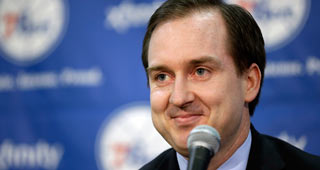There was a moment in Zach Lowe’s podcast with Sam Hinkie, which turned out to be a posthaste eulogy with his resignation a day later, in which Hinkie talked about how the decisions of the past “live on”.
“What people don’t get is all the good selections (the Celtics) made over a long period of time,” said Hinkie. “Rondo, Al Jefferson, Gerald Green, Tony Allen, Perk. And how those live in this team. How that flows forward. Obviously Al and Gerald were in the deal for KG and KG was in the deal for the Nets’ stuff. The Nets’ stuff hasn’t come to fruition yet but it will and it will be helpful.
“Rondo lives on in Jae Crowder.
“There’s a set of really solid decisions, not over two or three years but over eight or 10 or 12 that the Celtics have been able to make that have put them in this position.”
When you look at what the Celtics gave up to put together their team that won one title in 2010 and nearly won another in 2010, then look at how many assets they received once they sold those players off, you can see Hinkie’s point illustrated perfectly.
Judging the three years of moves Hinkie made while general manager of the Philadelphia 76ers will be problematic because those decisions will live on for years if not decades. The 76ers are currently owed picks until 2021, a lot of picks. It’s the best GM job in the NBA to inherit because the results on the court can only possibly improve and there are so many assets to work with to convert the roster into a playoff team within one to two years. Where will Hinkie’s impact end and his successor’s begin? There will be fingerprints over fingerprints. The assets his ethos accumulated will live on in the 76ers indefinitely even though it's back with a nepotistic establishment.
Hinkie accepted Jerry Colangelo’s arrival but with Bryan Colangelo coming to the 76ers’ front office in some sort of co-GM role, Hinkie stepped down knowing he could no longer execute his vision for the franchise. Hinkie acknowledged how front offices have become more collaborative with the Golden State Warriors proving to be the best example currently. The Warriors’ front office works because they have active voices coming from such vastly different perspectives. Hinkie was going to lose all power struggles against the Colangelos in ways Bob Myers doesn’t against the Lacobs.
In his 13-page farewell letter manifesto, Hinkie quoted Lincoln, Buffett, Max Planck amongst many other seemingly random notables, but there was no Benjamin Disraeli “never complain, never explain” quote included. Hinkie overexplained, even if his letter was never meant for public consumption; everything is meant for public consumption in this social media era.
Hinkie lost 20 pounds earlier this season due to the stress of the 76ers’ continued win-loss struggles and several off the court issues. That and his response to the question of whether it is easy to win trades when you’re not trying to win games is the complaining part.
The 13-page letter leaked to the media, which were actually standard operating practices during his tenure, is the explaining part of the equation. There are plenty of ways to rationalize his core principles without coming across in such an abstract, poorly considered TEDx talk where there’s no there there. Jason Concepcion called it “BS artistry” after the Lowe podcast. Hinkie may as well be riding shotgun with Matthew McConaughey in a Lincoln talking to himself.
Hinkie is clearly intelligent but also clearly not as intelligent as he thinks he is; if he was, he would be able to explain himself in more lucid way and not be so adamant about trying to prove his acumen in a self-aggrandizing way.
Hinkie tried to turn a red paperclip into a championship contending NBA team. Being an NBA GM involves managing your front office, your roster, your coach, your peers of other teams, the media and agents. By most accounts, Hinkie struggled in many of these areas, especially with certain parts of the media and agents.
The three primary reasons why Hinkie’s tenure prematurely ended, however, are injuries, compounding those injuries by drafting too many traditional big men and not winning a lottery to draft a transcendent talent.
The Joel Embiid pick remains the right one regardless of whether or not he ever plays but it became a distracting farce at times for Hinkie. Embiid seems to be on track to actually play next season and he’ll be very good if he can stay on the floor. He may even become that transcendent talent we’ve seen Karl-Anthony Towns become, but it didn’t happen quickly enough for the 76ers to continue trusting Hinkie.
But the presence of Embiid means the 76ers have a glut of bigs with Nerlens Noel and Jahlil Okafor also important parts of the roster. The NBA is moving smaller and Hinkie has continued to believe a great big man is still the most valuable asset in the league. The issue is you can only play one traditional big man at a time against so many teams in the current era as it is too easy to play one of them off the floor by spreading the floor. The diminishing returns began once the Lakers drafted D’Angelo Russell over Okafor, and Hinkie stayed true to his best asset available modus operandi.
Hinkie constructed his roster on paper believing he could figure out the mechanics of how they complement each other down the road by trading in his valuable assets for better fitting assets. The lesson we’ve learned with the Warriors and Spurs as opposed to the Cavaliers and Thunder is that you not only need elite talent, you also need to have that elite talent make each other meaningfully better. Even if Hinkie was able to get all of his assets on the floor, there was nothing to suggest this element of cohesion would materialize quickly enough and make the multi-year endeavor worth it when you get so little out of invaluable rookie scale salaries.
I still trust the methods and concept of a multi-year strip down. It could have still worked for the 76ers and it could work for another GM or franchise in the future. Hinkie leaves the 76ers in a far better position to compete for a title than his predecessor did. The next iteration will be more stealth and less comprehensive.



